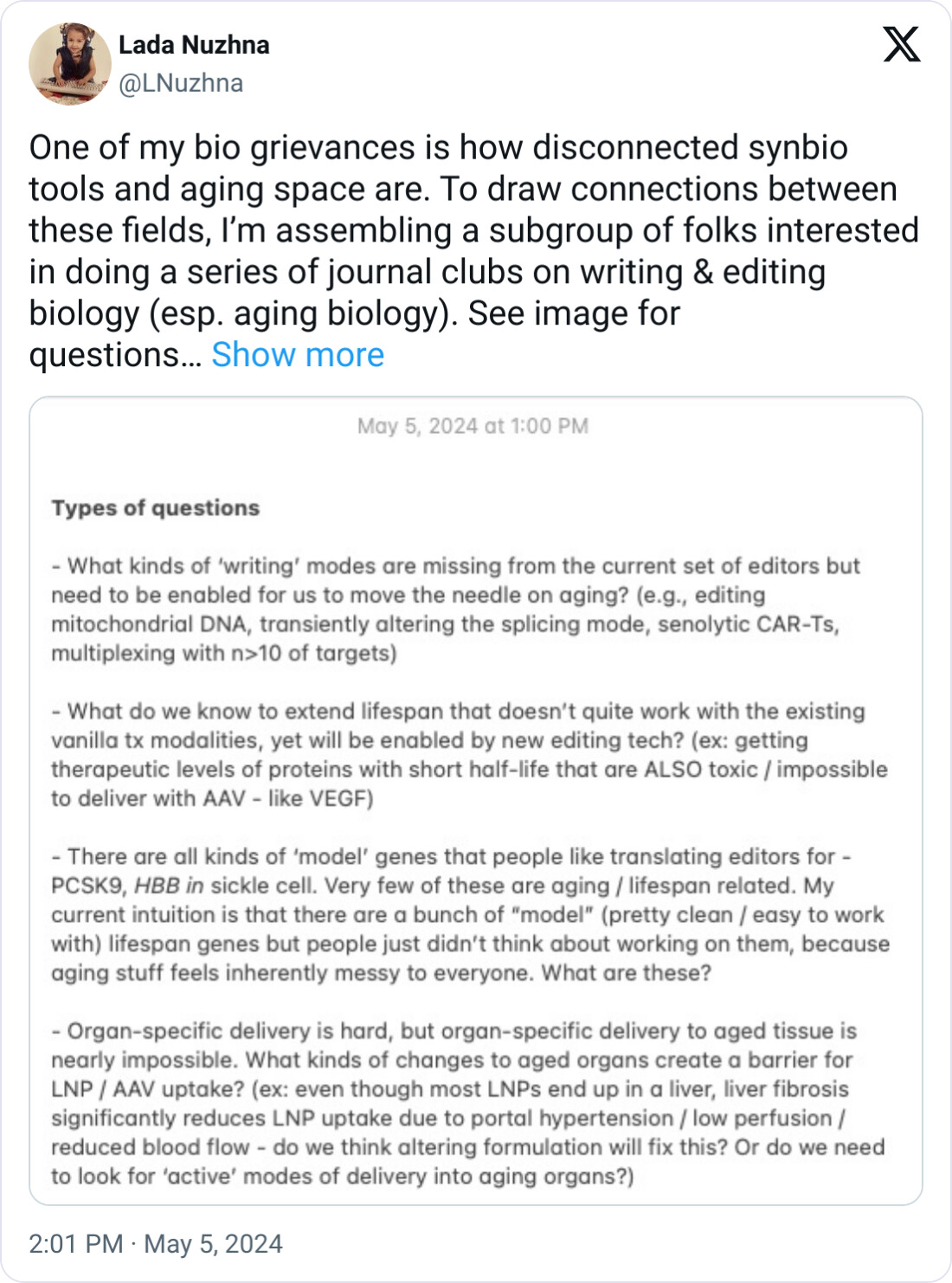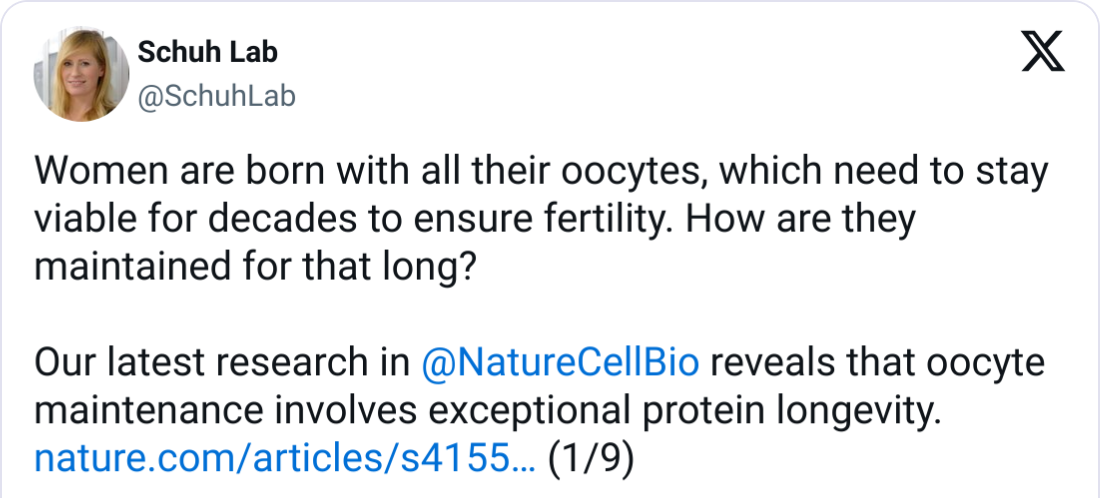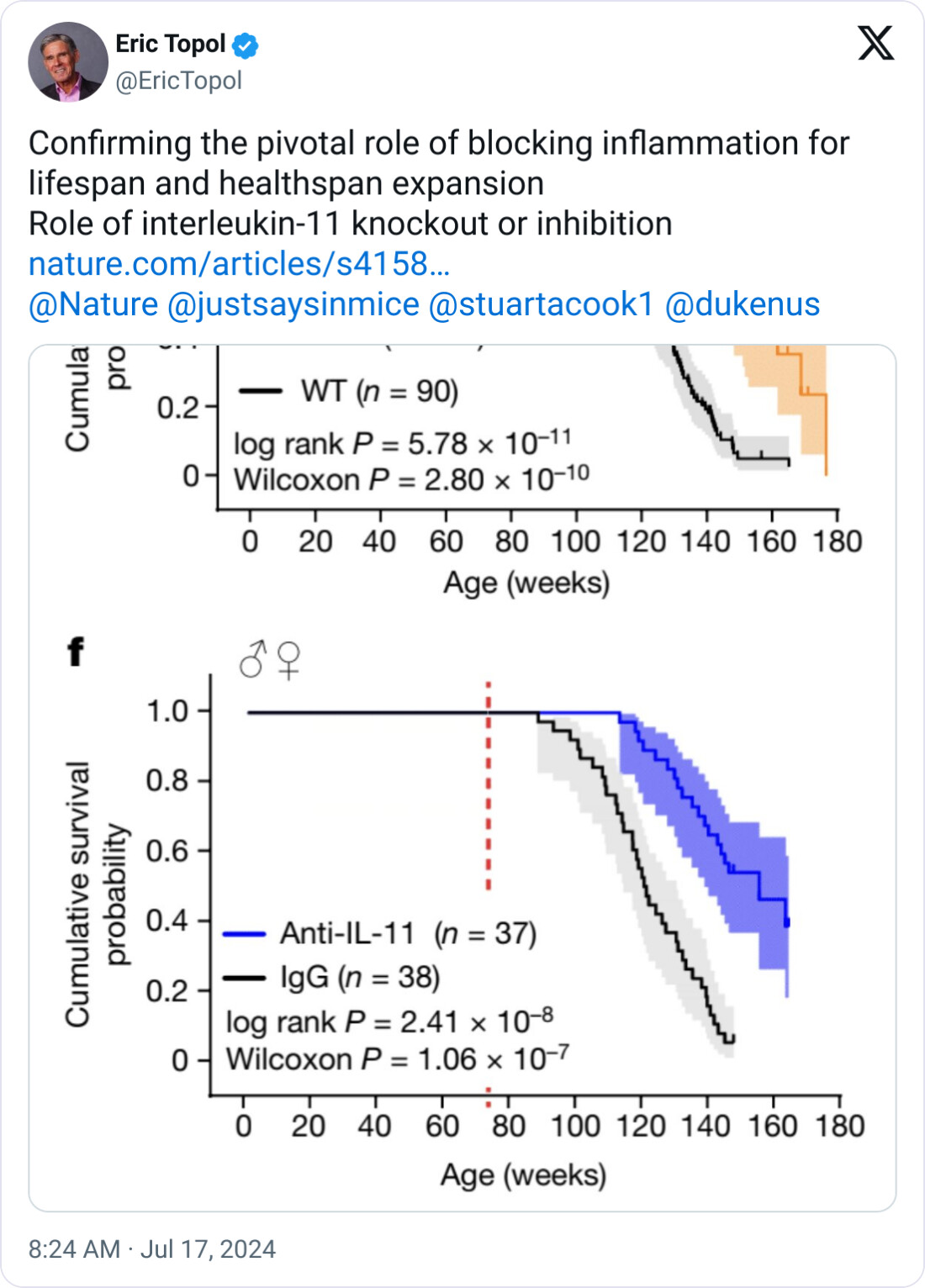Q2 '24 Newsletter
Q2 Highlights
Laura launches Cradle – Cofounders Laura Deming and Hunter Davis launched Cradle Healthcare Co. on June 3rd. Operating in stealth for the past 3 years and raising $48M in funding, Cradle has demonstrated recovered electrical activity in a cryopreserved and rewarmed slice of rodent neural tissue – the first successful attempt of its kind.
The company’s ultimate moonshot goal is human whole-body reversible cryopreservation - “placing people with illnesses into a frozen state and then reviving them at some stage in the future when cures for their ailments have arrived.”
Taking the stage at Aspen Ideas Health – Laura joined Kristen Fortney, CEO of BioAge, and Rick Klausner, Co-Founder & CSO of Altos Labs, on stage for the “You Can Live Longer!” panel at Aspen Ideas Health. The discussion covered gene editing, cell reprogramming, AI-driven compound repurposing, targeted metabolic therapies, and other novel approaches to combat age-related diseases.
Drug extends lifespan in mice by 25% – Scientists have developed a drug that extends the lifespan of mice by nearly 25%, resulting in healthier and more youthful animals. Compared to other interventions, its effect is also notable. The drug, which targets the protein interleukin-11 (IL-11), is currently in trials for lung fibrosis, and researchers are optimistic about its potential to combat aging in humans. Full paper here.
Portfolio Company News
Longevity startup Loyal is working on a drug to extend the lifespan of dogs – The fundraise, which began shortly after the FDA confirmed that Loyal’s data supports a reasonable expectation of effectiveness for large dog lifespan extension, was led by Bain Capital Ventures.
Gordian launches new platform – Gordian Bio’s Mosaic Screening method tests gene therapies directly in living, aged animals, ensuring more accurate and scalable drug discovery. This approach allows for thousands of rapid, cost-effective tests, addressing the complexity of diseases like osteoarthritis, metabolic dysfunction-associated steatohepatitis (MASH), and heart failure with preserved ejection fraction (HFpEF).
Rubedo Life Sciences closes $40M Series A financing – The round, led by Khosla Ventures and Ahren Innovation Capital, will enable Rubedo to advance their lead candidate, RLS-1496, into Phase 1 clinical trials for chronic atopic dermatitis and psoriasis. Rubedo founder, Marco Quarta also recently presented on longevity medicine at TedxCortina in the Italian Alps.
Aging & Biotech News
Vertex reports positive results in stem cell trial for type 1 diabetes – Vertex Pharmaceuticals announced encouraging results from their Phase 1/2 trial of VX-880, a new treatment for type 1 diabetes. All 12 patients who received the full dose showed improved blood sugar control, and most reduced or stopped using insulin. The trial is expanding to 37 participants, highlighting the therapy’s potential to significantly improve diabetes management.
Gameto raises $33M in Series B financing to advance development and commercialization of novel fertility treatments – Gameto, a biotech company focused on infertility solutions, has raised $33 million in a Series B round, bringing its total funding to $73 million. The funds will support U.S. clinical development and international launches of Fertilo, which uses engineered ovarian support cells to mature eggs outside the body, potentially reducing IVF and egg-freezing cycles from weeks to days.
Altos rejuvenation research in mice signposts healthspan extension – At Aspen Ideas Health, Altos Labs Co-founder Rick Klausner highlighted an experiment showing that rejuvenating old kidneys before transplanting them into younger recipients can significantly improve their function. He also described how reprogramming treatments in mice extended their healthspan and improved various aging symptoms.
Scientific Highlights
Long-lived proteins preserve oocyte health and support fertility for decades – Researchers have discovered that the maintenance of oocytes in mammalian ovaries involves extreme protein longevity, which helps preserve the oocyte proteome for decades. However, the decline in these long-lived proteins with age may contribute to the rapid decline in female fertility.
ARPA-H launches program to bioprint organs on demand – eGenesis and OrganOx have announced the successful completion of a 72-hour extracorporeal perfusion using a genetically engineered porcine liver connected to a brain-dead human donor at Penn Medicine. This milestone in the PERFUSE-2 study was achieved without immune rejection. Planning of first-in-human studies is underway.
Tweets We Liked
We fund healthy
lifespan extension



